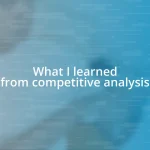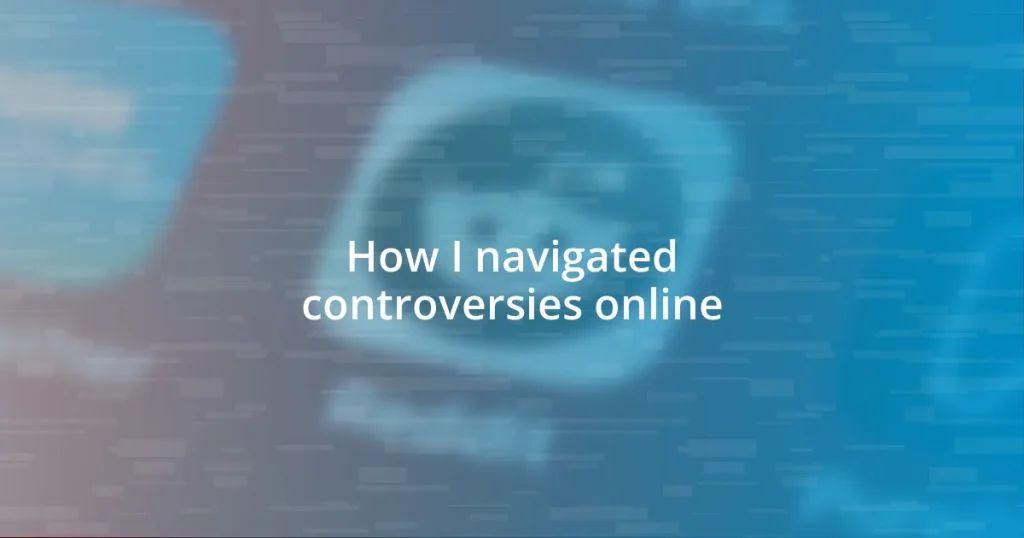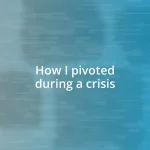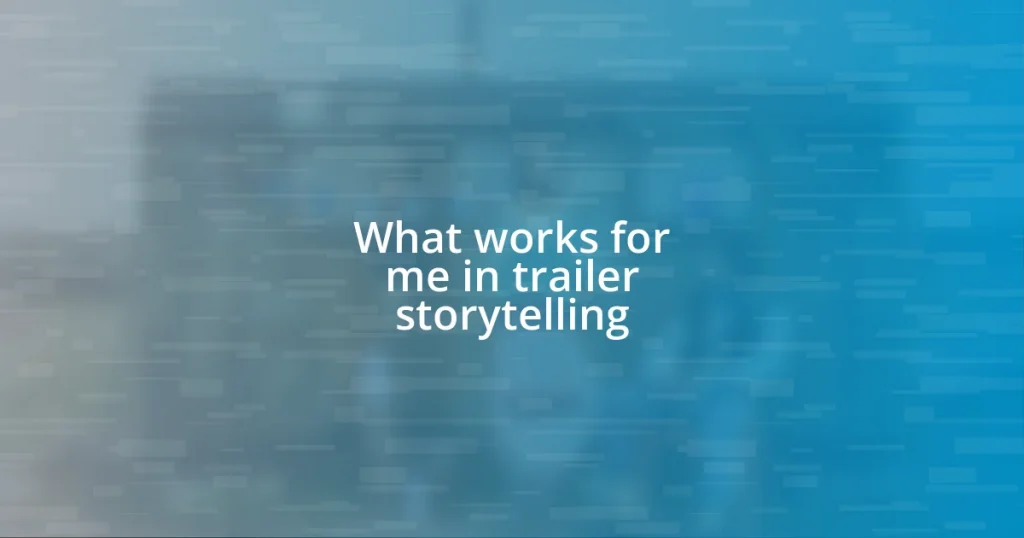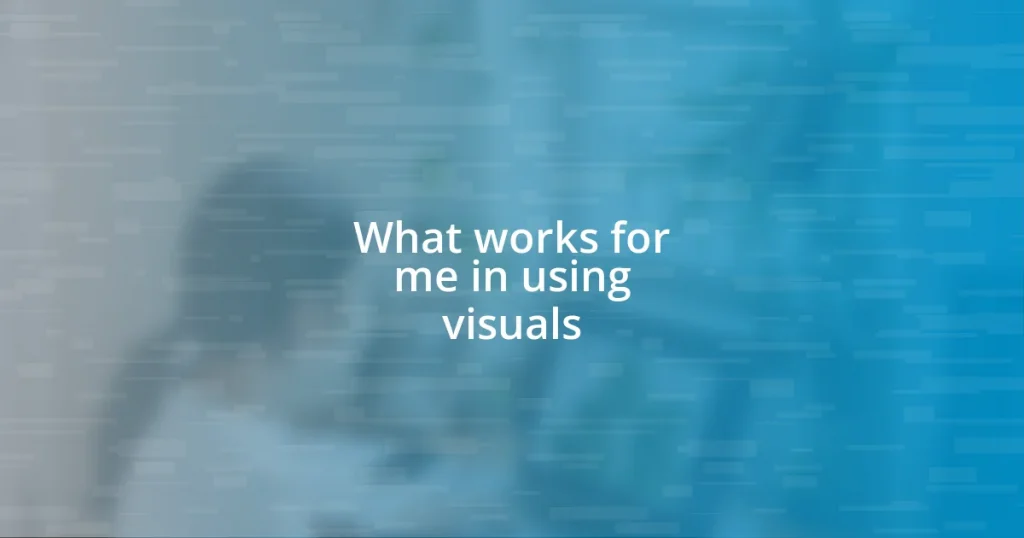Key takeaways:
- Online controversies can escalate quickly, often stemming from misunderstandings or miscommunications amplified by social media.
- Evaluating personal values and beliefs is essential for engaging constructively, helping to articulate informed responses that promote meaningful dialogue.
- Building a positive online reputation relies on authenticity, empathy, and maintaining professionalism, encouraging trust and respect in digital interactions.
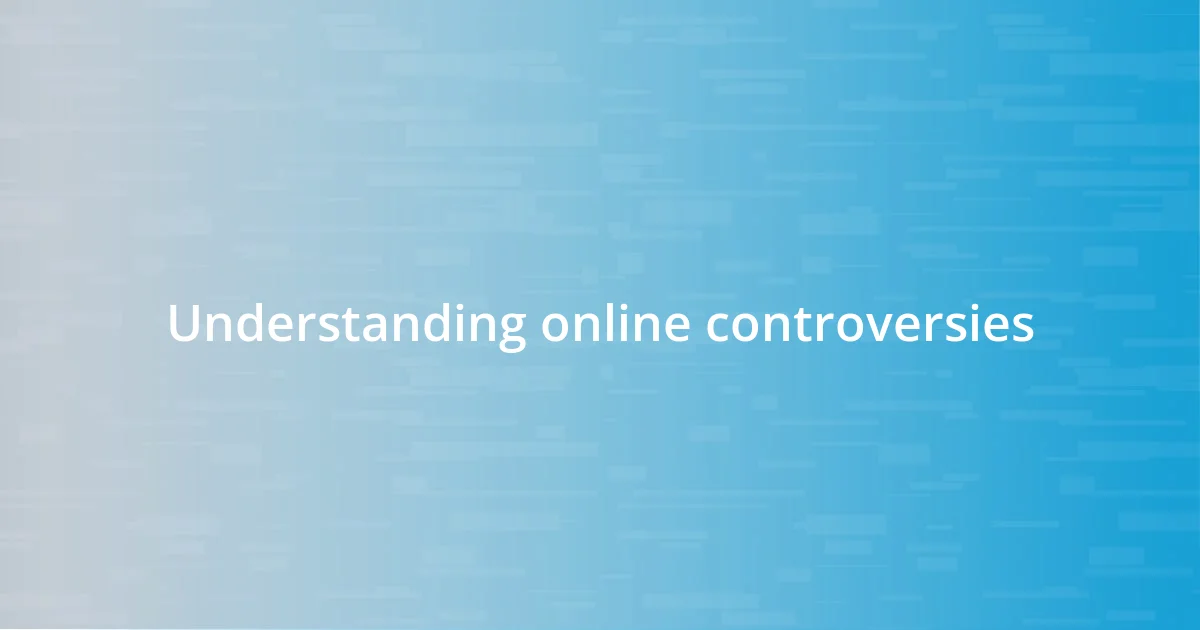
Understanding online controversies
Online controversies are like a wildfire; they can erupt from a single spark and spread rapidly across digital platforms. I remember once encountering a heated debate over a seemingly innocuous tweet that spiraled out of control. It made me realize how quickly opinions can polarize, often igniting passionate responses that overshadow the original context.
Diving deeper into these situations often reveals that the root cause is a misunderstanding or a miscommunication. Have you ever noticed how easy it is to misinterpret tone or intent in written form? I’ve found that taking a step back and analyzing the nuances can shed light on why certain topics trigger such fervent reactions. It’s fascinating—and somewhat alarming—how social media amplifies these misunderstandings, leading to a cascade of opinions that can sometimes feel out of touch with reality.
Emotional reactions often drive the discourse, making it hard for people to engage in constructive conversations. When I was embroiled in a controversial topic myself, I felt the weight of both defending my stance and acknowledging others’ feelings. This duality brought me to question whether we can ever truly understand each other when emotions run high.
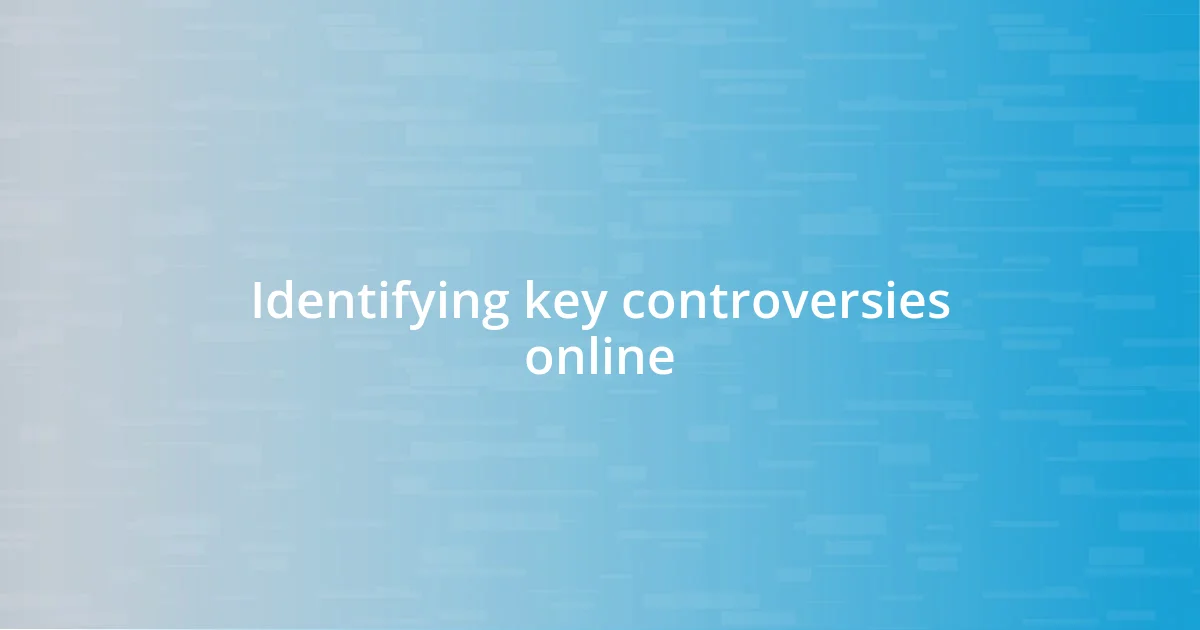
Identifying key controversies online
Identifying key controversies online requires a keen sense of observation and clarity. In my experience, I often start by browsing trending topics on social media platforms. That initial glance can reveal what’s igniting conversations and, sometimes, arguments. I vividly recall a moment when I stumbled upon a debate about a popular celebrity’s political stance. To my surprise, what seemed like a straightforward opinion became a battleground for intense discussions, emphasizing how different perspectives can quickly escalate tensions.
Here are some strategies to help pinpoint these key controversies:
- Monitor trending hashtags and topics regularly.
- Observe the comments section on viral posts for recurring themes.
- Pay attention to influential voices in specific communities; they often drive the conversation.
- Look for patterns in the types of issues that trigger strong emotional responses.
- Use tools like Google Trends to gauge public interest and sentiment around specific subjects.
Understanding these elements not only enhances my ability to navigate these controversial landscapes but also sharpens my awareness of how the online environment can morph and evolve before my eyes.
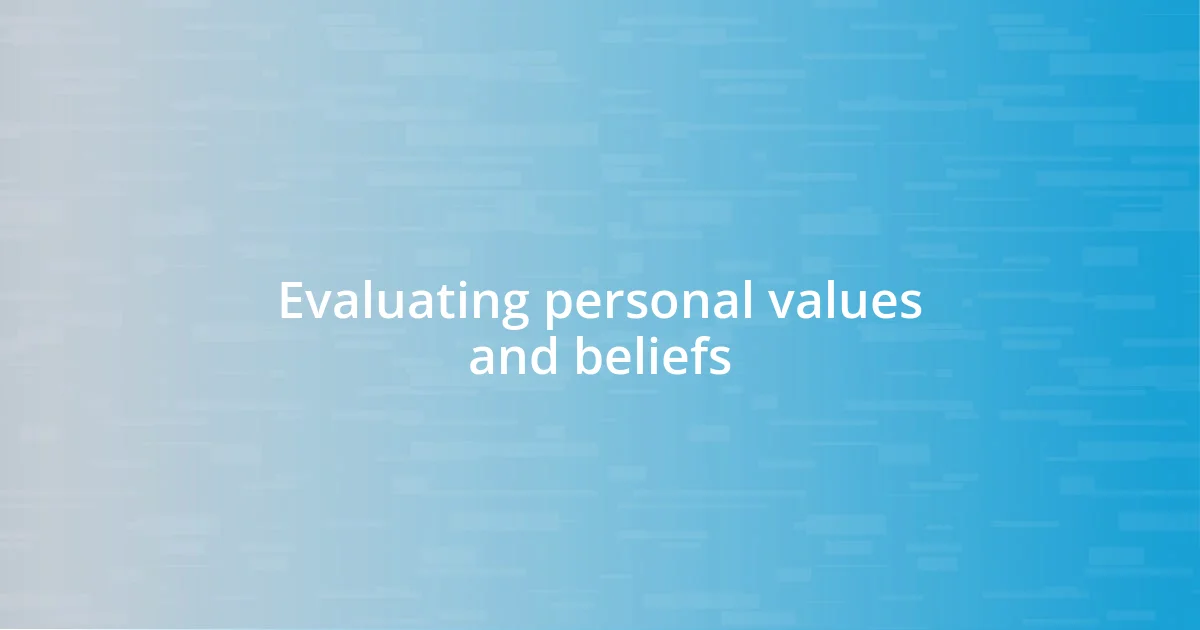
Evaluating personal values and beliefs
Evaluating personal values and beliefs is crucial when engaging with online controversies. When faced with heated discussions, I often revisit my core principles to navigate the tumultuous waters of social media. For instance, I once found myself caught in a debate about freedom of speech versus hate speech. As I reflected on my values, I realized that understanding context was vital in shaping my viewpoint, guiding me toward a more balanced response.
In my journey, evaluating my beliefs pushed me to align my reactions with my values. I distinctly recall a tiff over a trending issue regarding environmental policies. Rather than impulsively reacting, reflecting on my commitment to sustainability helped me articulate a more informed stance, promoting a thoughtful dialogue rather than adding to the noise.
Ultimately, I find that the process of assessing my beliefs not only helps form my responses but also influences how others perceive my engagement. By standing firm in my values, I create a space for meaningful conversations instead of entrenched arguments.
| Aspect | Personal Insight |
|---|---|
| Understanding Core Principles | Reflecting on values anchors my responses. |
| Promoting Dialogue | A considered approach fosters constructive conversations. |
| Perception of Engagement | Staying true to beliefs shapes how others view my contributions. |
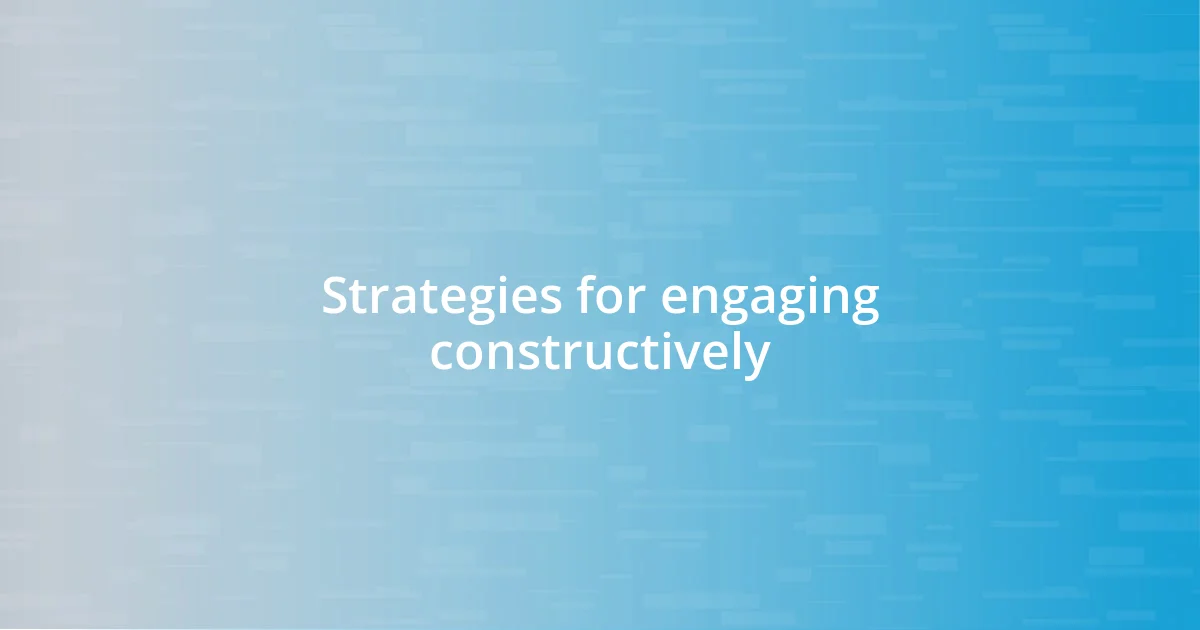
Strategies for engaging constructively
One effective strategy for engaging constructively in controversies is to listen before responding. I remember a time when I joined an online debate about mental health awareness, and instead of jumping in with my views right away, I took a step back and read others’ comments first. This approach helped me understand the various feelings people had related to the topic, which allowed me to craft a response that acknowledged their experiences and fostered empathy. Isn’t it interesting how much we can learn when we genuinely listen?
Another crucial tactic involves asking open-ended questions that encourage others to share their thoughts more deeply. I once posed a question in a discussion about educational reforms, asking how these changes might affect students’ emotional well-being. The responses were enlightening and opened the door for a richer conversation. This technique can create a more collaborative atmosphere, allowing everyone to express their views without feeling defensive.
Lastly, I find it beneficial to share personal experiences when they relate to the issue at hand. For instance, discussing my own struggles with balancing work and mental health gave the conversation a personal touch during a debate about workplace policies. This not only made my viewpoint relatable but also encouraged others to share their stories, transforming a potentially divisive exchange into a supportive dialogue. How often do we overlook the power of personal narratives in shaping discussions?
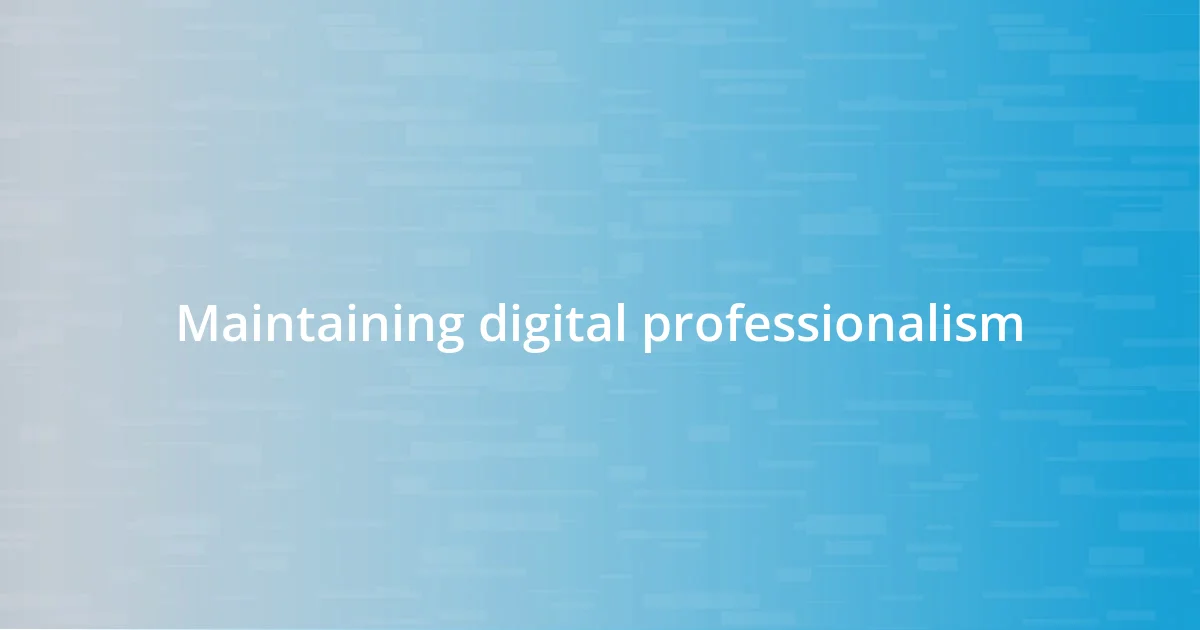
Maintaining digital professionalism
Maintaining digital professionalism requires a deliberate effort to communicate respectfully, even in heated debates. I remember a time when a comment I made during a divisive discussion about social justice was met with backlash. Instead of reacting defensively, I took a moment to revisit my wording. By choosing thoughtful language, I not only defused the situation but also demonstrated the kind of professionalism that invites constructive dialogue. Isn’t it fascinating how a few carefully selected words can change the course of a conversation?
One key aspect of digital professionalism is understanding the audience. During a networking event held on social media, I shared insights on industry trends but noticed several newcomers feeling overwhelmed. In hindsight, I realized that by adjusting my tone and simplifying my language, I could engage more effectively with diverse participants. It’s a valuable lesson that resonates with me; when we recognize the varied backgrounds of our audience, we cultivate a respectful environment where everyone feels included.
Consistency in my online presence has also been vital to maintaining professionalism. I recall a moment when I discovered a post I made two years ago that didn’t align with my current views. Instead of ignoring it, I chose to acknowledge it openly, showing my growth and commitment to learning. It reminded me that authenticity and accountability are cornerstones of professionalism online. How often do we reinforce our credibility by embracing change and growth in our digital interactions?
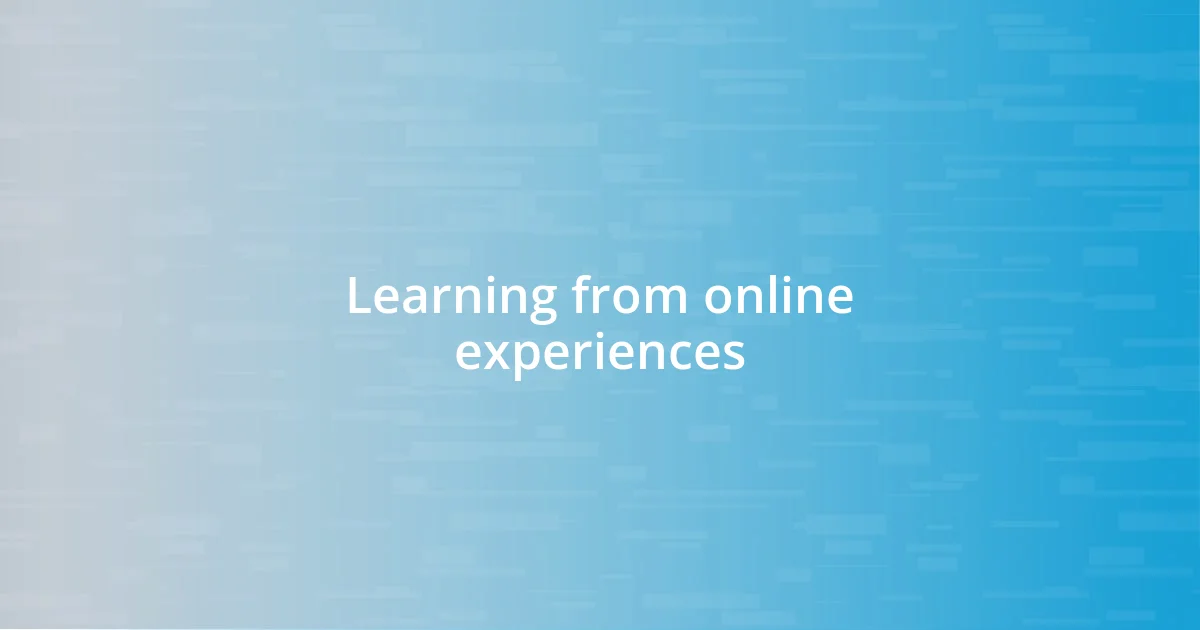
Learning from online experiences
Learning from online experiences isn’t just about navigating controversies; it’s about evolving through them. There was a time when I engaged in a heated debate about climate change and found myself stuck in an echo chamber of conflicting opinions. I stepped back and realized that by genuinely reflecting on the perspectives around me, I could identify common ground. Isn’t it incredible how stepping outside our own views allows us to grow?
In another instance, I participated in a discussion regarding digital privacy rights. Initially, I held a rigid stance, convinced my perspective was the only correct one. However, as I listened to others share their stories — some highlighting their personal experiences of privacy invasions — my views expanded. This taught me that every interaction is an opportunity to learn something new. How often do we miss powerful insights because we’re too focused on being right?
Through these experiences, I’ve discovered the importance of self-reflection in the digital space. After a particularly challenging online debate, I’d take some time to unpack my emotions and responses. I found that expressing my frustration or confusion in a journal helped clarify my thoughts. It brought to light how our emotional reactions can shape our online interactions, reminding me that taking a moment for introspection can lead to more constructive engagements. What would happen if we all paused to reflect before responding? It could transform the way we communicate online.
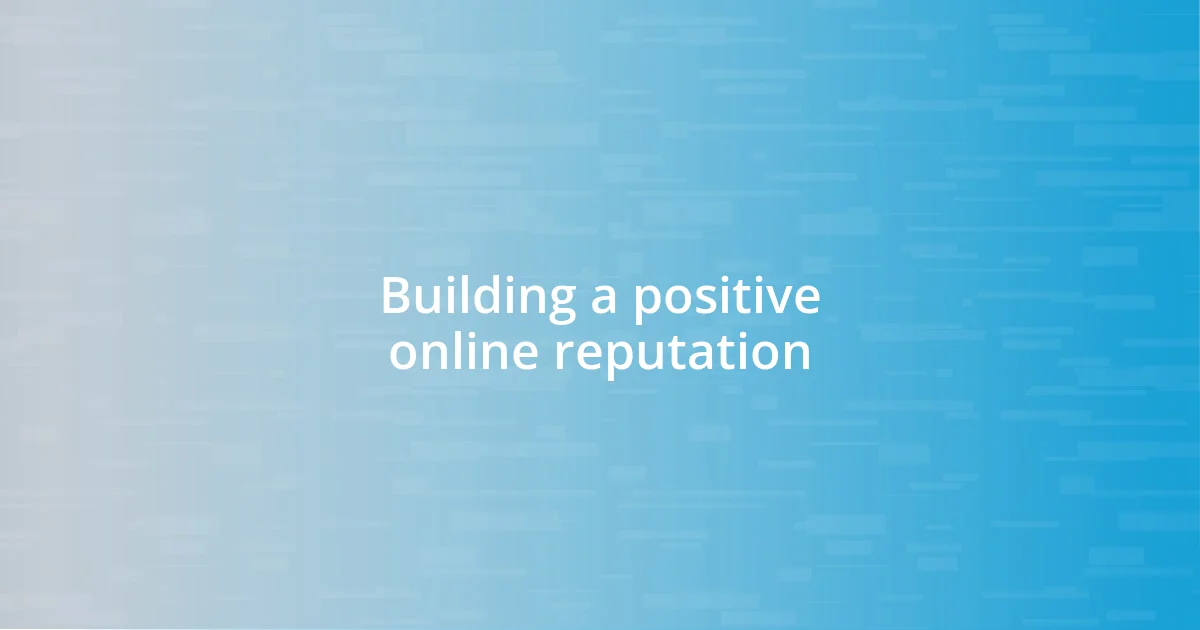
Building a positive online reputation
Building a positive online reputation starts with authenticity and transparency in every interaction. I once shared an article on a popular forum that addressed a controversial topic. Instead of merely sharing my opinion, I took the time to explain why I felt strongly about the issue, linking it to my own experiences. This approach not only garnered respect from others but also sparked meaningful conversations. Have you noticed how openness can create a bridge to understanding?
Engaging positively with others is another crucial part of shaping your online reputation. There’s a community I actively participate in, where I make it a point to celebrate others’ achievements openly. I recall cheering for a fellow member who published their first book. My genuine enthusiasm was not just about showing support; it made others see me as someone who uplifts rather than competes. How often do we pause to recognize the efforts of others, even in a digital space filled with competition?
Consistency and mindfulness in your online communications nurture trust over time. I learned this lesson during a series of contentious discussions about tech ethics. I intentionally maintained a calm and respectful tone, even when faced with hostility. Reflecting back, I realized that my choice to stay composed helped me earn respect, even from critics. Wouldn’t it be amazing if more of us approached disagreements with a mindset of curiosity rather than defensiveness?




